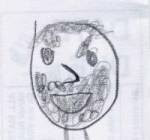You'll see that in the side bar I've included the materials I use (and hope to use) in our homeschool. But I have chosen those materials not entirely because they are subjects we need to cover: but because covering those subjects imparts skills I think we ought to have. The kids are young, yet. At this age, I'm just trying to get down the fundamentals.
We have a hard time getting to all of our material. And given my goals, I'm sure there are redundancies. I'm writing all this out here not just to tell you what we do and why, but to help clarify my thinking and perhaps simplify our lives as a result.
I have chosen to follow a particular model of home education called, for better or worse, "classical." As a homeschooling method, it began with the discovery of an
essay by Dorothy Sayers extolling the virtues of a medieval classical education with an eye and an ear to the different psychological "stages" on the child's ability to learn. It has evolved from there into various forms. I have read what I could and picked out what I've wanted for the goals I want to achieve.
I am also attracted to what is known as a Charlotte Mason education. There are tomes on her method, including those she wrote herself. It's a very attractive method, conjuring up images of well-trained, thoughtful and observant children reflecting the Victorian age in which she lived and taught.
However,
this is my go-to site for keeping me on track with what I'm supposed to be doing and how to go about it.
In both educational orientations there's the idea of moving from model to practice. You provide a child with a model of what is to be expected, to be emulated, and, eventually, executed.
The very best example is copywork. Here, a child is given a piece of fine prose or poetry or a Bible verse, written out. The child then copies it out letter for letter, word for word, including punctuation. It provides more than an example of correct penmanship--the idea is to provide the correct model for recognising good language. Copy work gives way to dictation, so a child can learn to write what he hears.
Parallel to this is narration. The child "tells back" the story he heard, the passage he read or describes the picture he sees in front of him. Thus they learn to synthesize, organise and summarize information.
The teacher writes the narration out in the beginning....later, after enough dictation (practice in writing what he hears) the child writes it out himself.
The narration is the foundation for all writing. Changing and manipulating the narrations can be used to teach grammar, vocabulary and spelling.
For now, these are the skills we're focusing on:
Brain Training:Models: Poetry. Latin. Bible Verses. Eventually, Aristotelian logic. (I may have to write up my own curricula for this for kids to use and understand.)
Method: Memory work, in the form of memorizing poetry and Bible verses (and math facts) establishes the habit of retaining rhythm and wisdom and knowledge. Translating Latin is where the brain stretches itself and we aim to get there quickly. Eventually, we'll do our Aristotelian logic and engage in Socratic dialogue. Fortunately, I have two degrees in Philosophy, so I feel fairly confident we can do this in the teen years. I'm just not sure how to get there from here, yet.
Materials: Um, poems, Bible verses and a good Latin program. Strategy games also fall into this category like Yahtzee, chess, checkers, Clue and Blokus. I also use a series in beginning logic called
Mind Benders.
Expression:
There are two kinds: verbal and non-verbal.
Verbal: The fine art of using language.
Models:
The Bible, Poetry, Quotations and Maxims, stories and good books. We need to know what to listen for, we need to know what is a well constructed sentence, as well as what is a good sentence aesthetically. The same goes for stories, and later, arguments.
Methods:
I read books to them. We also use copywork, narrations, and for now, a formal study of grammar, spelling and writing.
Materials:
I have two programs for grammar (one for each child), one for spelling which they do together, and one for writing.
Beyond copywork and narrations we aren't doing any writing. I think this is a disservice to the ten year old but the program I've picked is so teacher-intensive and thorough that my mind balks at the amount of time I think it would take to do it with him. He also needs to be able to type: that's the best way to handle a great volume of words at this age.
I aim to do something with spelling and grammar every day. These are subjects we will drop doing formally at some point so I feel sort of rushed to get through them quickly now.
Science (which I can't ever seem to get to) and History are fodder for narrations and copywork.
Non-verbal: The Cutural Arts.
This is strongly emphasised in the CM method of education, the classical method doesn't place as much emphasis on it--not even half so much as the original Greeks and Romans did. This, I think is a result of following the medieval model of classical education: it's as if the Renaissance never happened.
We don't do as much of this as I would like, either.
Models:
Music, Poetry, Plays (both live and on video and CD), Art.
Method:
Exposure, mostly. I'm working on the implementation, slowly.
Means:
Both study an instrument. I have plans and materials to start teaching us to draw. We go to plays at our local theatre.
Looking at this, I'm realizing that really, we just need to focus on Music and Art. The poetry and plays are really part of our verbal expression program. That seems much more manageable.
Mathematics:
We don't actually do mathematics. Real math is brain-training at its highest form. In a brilliant explanation of mathematics Adrian outlines the proper method of teaching it, starting out with the Big Questions and ending up at an understanding of sets. I do want to get us to this at some point. I'm just not sure how. For now, we do arithmetic. I use a program that explains part of the rationale behind the computations. Not in an intimidating way, but in a kid-friendly "oh now I get it way" that's extremely empowering. I'm not afraid of arithmetic anymore. I was when we started.
Looking at the world from a Christian Perspective. More generally and briefly known as our "worldview."
As Christians, I want my children to have a particular world-view, a biblical world-view like Francis Shaeffer talks about in What Shall We Do Now?
Models: The Bible, reading a non-Catholic version of the lives of Saints.
Methods: memorizing Bible Verses, studying the Bible, catechisms, going to church. I think I may have them memorize one of the shorter creeds, too.
Materials: For now, it's simply a course in conflict resolution and Bible Study. Developing a world view is a lot more than just going through a Bible Study program, of course. Still, the one I've picked (by Memoria Press) does present the material so that one can begin to understand that being a Christian means to occupy a particular set of beliefs about the world, its Creator and our relationships to everything and everyone in it.
Get a general idea of stuff so that when we do it in more depth later on you have some idea what we're talking about:
In this category we have History and Science.
And that, as they say, is that.
This has been helpful. Not the least of which is that it I now have something called my "educational plan" somewhat written up. The "EP" is a legal requiremnt I have to file with my school board in order to continue hs'ing. I only just realised, as I was typing this, that I hadn't done one for this school year!




























